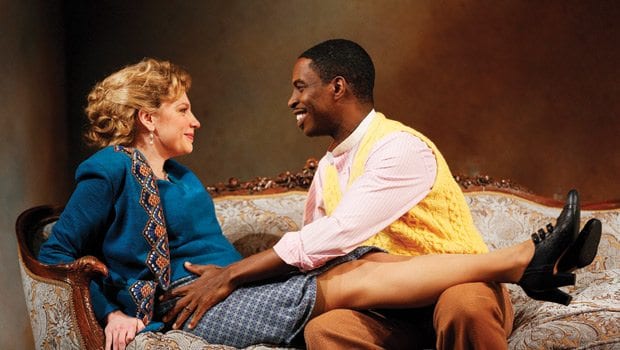
All is not well in the household of Torvald and Nora Helmer on Christmas Eve. Torvald tells his wife of his promotion to bank director. “Our lean years are over,” he exults, and Nora too is thrilled with the news. Yet she cajoles Torvald for cash, and he teases her for her spendthrift ways.
Nora needs the money to hush up Nils Krogstad, who once lent her the funds to pay for a year in Italy that cured Torvald of his tuberculosis. Claiming that the money was a gift from her father, Nora forged his signature to obtain the loan. Now, unless Nora gets Torvald to rehire Krogstad, whom he dismissed for unethical behavior, he will reveal all.
No spoiler alert is necessary for the famous final scene of Henrik Ibsen’s masterpiece, “A Doll’s House,” which concludes with the sound of a shutting door as Nora walks out on her husband, recognizing that their eight years of marriage is based on illusions.
A scathing portrayal of the Helmers and their toxic compromises, the play premiered in Copenhagen, Denmark, on Dec. 21, 1879 and brought Ibsen international fame. Since its debut, the play has been published in 78 languages and remains on stage somewhere almost all the time.
A new Huntington Theatre Company production of “A Doll’s House,” directed by Melia Bensussen with a script adapted by Bryony Lavery, is on stage through Feb. 5 at the Avenue of the Arts/BU Theatre, on Huntington Avenue.
Although staged by a much-awarded director and performed by an accomplished cast, the production takes a while to mine the full power of Ibsen’s drama.
James Noone’s set, deftly lit by Dan Kotlowitz, is a portrayal of domestic unease. A pared-down silhouette of a house fills the stage, lit by a sky of blue and red streaks that evokes an iconic painting by Ibsen’s occasional set designer, Edvard Munch, “The Scream” (1893-1910). The play opens with brooding music by Rob Milburn and Michael Bodeen.
The living room is furnished with period objects, including a gramophone and a turn-of-century couch. Costumes by Michael Krass are upper-middle-class daywear, natty for Torvald and somewhat frumpy for Nora, until Act III, when they don sensuous party attire.
Uneasy marriage
As directed by Bensussen, most of the actors perform at a higher than natural pitch. They speak rapidly, without fully developing the humanity of their characters. As a result, they remain at a distance from each other and the audience.
On opening night, last Wednesday, interactions among Nora, Torvald and their friends drew laughter at a frequency more typical of a drawing room comedy than a taut drama.
Sekou Laidlow’s Torvald is handsome and athletic-looking and speaks with a slight Southern lilt. As Nora, Andrea Syglowski expresses her character’s growing desperation by frequently covering her mouth with her hand.
It’s hard to see how these two could stay together for eight years. Torvald showers Nora with diminutives, such as bird names, as she twitters around the room, preparing presents and decorations to surprise their three children. When Nora insists that he not check the mailbox, fearing a letter has arrived from Krogstad, Laidlow’s Torvald says, “The child will have her way,” with a touch of disdain rather than teasing charm.
Marinda Anderson brings warm energy to her role as Nora’s childhood friend, Christine Linde. Now that the man she married for his money has died and left her penniless, Christine arrives seeking a new life. Battle-worn and wise, she reflects on her compromises and tells Nora,“One must live.”
Light lingers on Christine’s face as Nora names her blackmailer. Krogstad (Nael Nacer) is the man Christine would have married, had she not needed to support her ailing mother and younger brothers.
A wily dramatist, Ibsen creates in Nils and Christine an alternate coupling based on bruised reality and reconciliation. In contrast to the clueless Helmers, the two find new life together as equals who understand and accept one another.
Gripping climax
Ibsen also builds in scenes of bodily expressiveness, which Syglowski performs to the hilt. While conversing with her good friend, Dr. Rank (Jeremy Webb), a flirting Nora leans over him, giving him a glimpse of her breasts, before pulling back.
Torvald wants to show off a dancing Nora at their Christmas party. When he insists that they practice the tarantella, a folk dance they learned while in Capri, she breaks into a wild, free-spirited solo. Torvald and Dr. Rank watch in amazement.
In Act III, the dreaded letter arrives and dissolves the charade that is the Helmers’ marriage. Here, the production coalesces into a gripping encounter between Nora and Torvald. Syglowski embodies Nora as she speaks to Torvald plainly, in short sentences, and gains power. Laidlow renders both the rage and desperation of Torvald, who is at first a seething menace and then a bereft and bewildered man.






